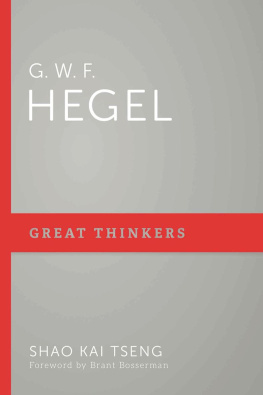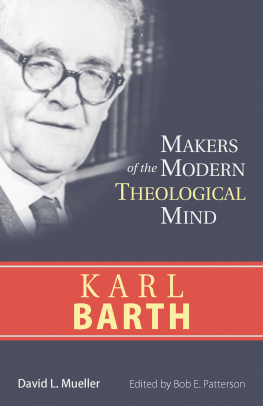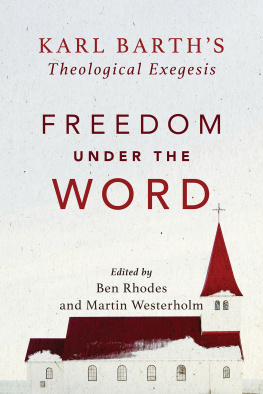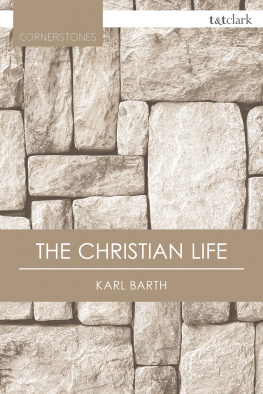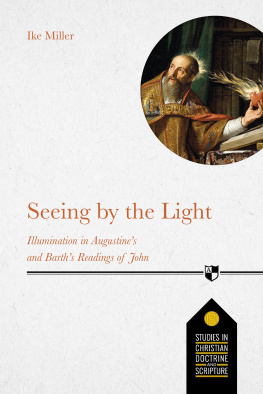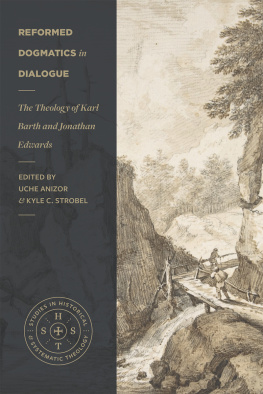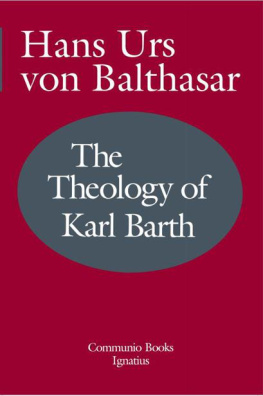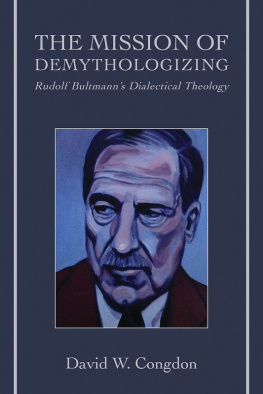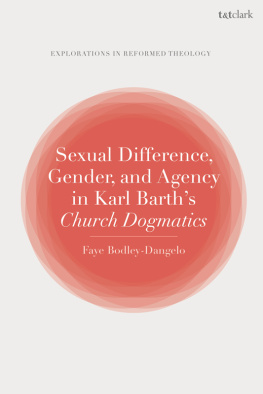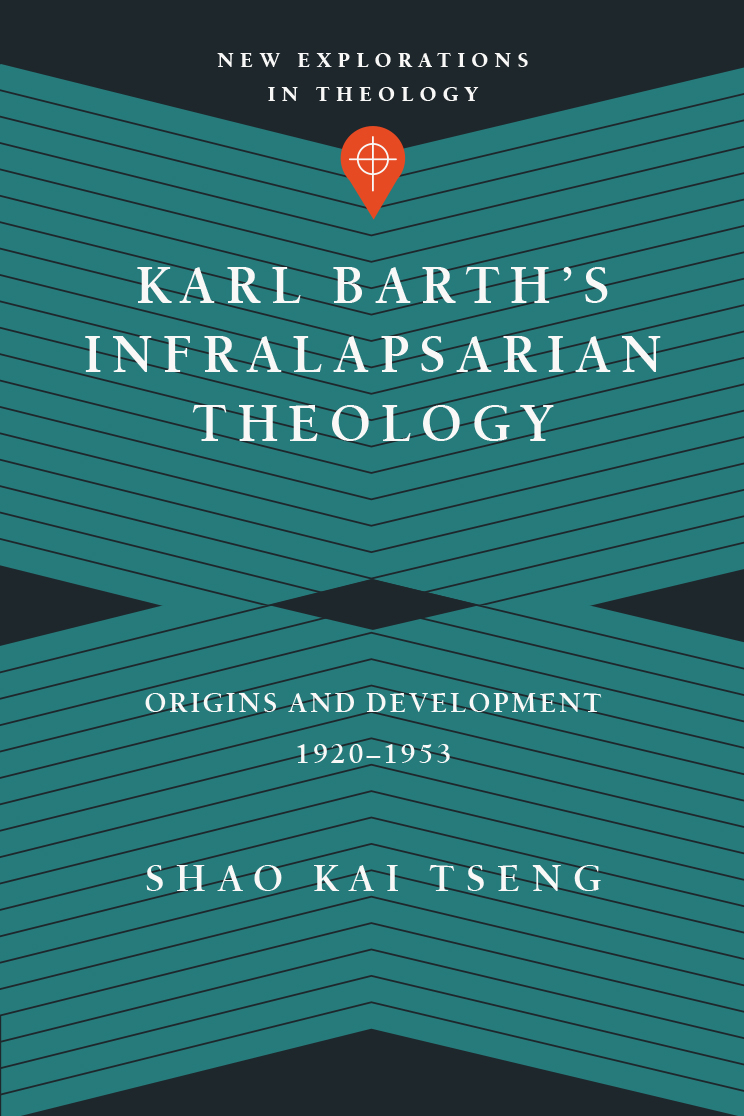NEW EXPLORATIONS
IN THEOLOGY
KARL BARTHS
INFRALAPSARIAN
THEOLOGY
ORIGINS AND DEVELOPMENT
19201953
SHAO KAI TSENG
Foreword by GEORGE HUNSINGER

InterVarsity Press
P.O. Box 1400, Downers Grove, IL 60515-1426
ivpress.com
2016 by Shao Kai Tseng
All rights reserved. No part of this book may be reproduced in any form without written permission from InterVarsity Press.
InterVarsity Pressis the book-publishing division of InterVarsity Christian Fellowship/USA, a movement of students and faculty active on campus at hundreds of universities, colleges and schools of nursing in the United States of America, and a member movement of the International Fellowship of Evangelical Students. For information about local and regional activities, visit intervarsity.org.
Cover design:Cindy Kiple
ISBN 978-0-8308-9982-1 (digital)
ISBN 978-0-8308-5132-4 (print)
Library of Congress Cataloging-in-Publication Data
A catalog record for this book is available from the Library of Congress.
To my parents
Contents
Foreword
George Hunsinger
I n this fine study Professor Shao Kai Tseng makes a solid and creative contribution to Barth studies. By charting how Barth revised his view of election from some of his earliest sketches to his mature views, great light is cast on Barths theology as a whole. In particular Professor Tseng traces the development of the rather technical, but nonetheless very important, distinction between supralapsarianism and infralapsarianism in Barths doctrine of election.
Professor Tseng makes the striking proposal that because Barth viewed Jesus Christ as the object of election, his ideas were actually in line with the historic infralapsarians of the Reformed tradition rather than with the supralapsarians with whom Barth explicitly, though not uncritically, aligned himself. Whereas Barth designated his conclusions as purified supralapsarianism, Professor Tseng argues to the contrary that Barth should be seen instead as basically infralapsarian. The reason is that in accord with the infralapsarians, but unlike the supralapsarians, Barth saw pretemporal election in Christ as oriented to the salvation of fallen human beings.
Professor Tseng makes a powerful argument. At the level of conceptual analysis and general historical sensitivity, it would be hard to quarrel with it. In that sense it is a fine and original piece of work. I suspect that in many ways the contribution Tseng makes will be a lasting one.
Nevertheless, I have an important reservation. I think it would be better to agree with Barth that in the end he was a purified supralapsarian, while still accepting the thesis, as advanced by Professor Tseng, that he has strong infralapsarian tendencies. With that caveat I think we could say, splitting the difference, that Barth was strongly though not basically infralapsarian. He represented a purified supralapsarianism with strong infralapsarian elements.
To make his case Professor Tseng relies heavily on a remark that I once made about Barth. I observed that Barth did not want to commit himself on the question of whether the incarnation would have occurred without humanitys fall into sin. Barth believed it would be speculative and unwarranted to take a stand on such a matter. So far, so very good. That was Barths official view, and I would stand by my remark.
Nevertheless, it is astonishing how many wheels within wheels Barths dialectical engine can keep spinning. There are passages in the Church Dogmatics that make it sound as though there would indeed have been an incarnation even if the world had not fallen into sin. To this effect there is an almost inconspicuous but still discernible thread that runs through the great, imposing tapestry of Barths mature dogmatics.
Let me give just one example. Near the beginning of Church Dogmatics, volume IV, part 1, Barth has a long section called The Covenant as the Presupposition of Reconciliation. A careful reading of this material shows that for Barth not only does reconciliation presuppose a logically prior covenant, but the covenant always involves Jesus Christ as its essential content. The covenant is thought to be ontologically basic and prior to reconciliation. Reconciliation is seen as a contingent but not an essential means by which God would fulfill his original covenantal will (Bundeswillen) for his creation. There would still have been a covenant even if the world had not fallen into sin. Furthermore, as the eternal Word of God through whom all things came into being, Jesus Christ was at once the covenants center and the means ordained for its fulfillmentwith or without the fall.
Barths views along these lines are scattered throughout the opening of IV/1. He does not present them thematically or even all in one place. Perhaps the first indication appears in his surprising remark that the creature as such is in need of salvationnot merely the creature qua sinner, but precisely the creature qua creature. Salvation, Barth states, is the perfect being which is not proper to created being as such but is still future. Created being as such needs salvation, but does not have it: it can only look forward to it (IV/1, 8). Salvation for the creature will involve eternal life in communion with God. It will be a gift over and above the gift of creation itself. It will mean nothing less than being given a part in the being of God (though without divinization in any crude sense) (IV/1, 8).
Gods reaction to the creatures fall into sin is a contingent reaction (IV/1, 9). The fall is not in itself the occasion for Gods original and fundamental will to enter into covenant with his creature. If we start from the incarnation as Gods contingent reaction to the fall, we can perceive in it a more primordial divine intention. In Jesus Christ we see both the fact and also the manner in which it is determined from the very first and already initiated (IV/1, 36). Gods will-to-covenant (Bundeswillen) is given with creation as such. It is prior to and independent of the fall. It is not only a reaction, but a work of the faithfulness of God (IV/1, 36). From the very outset this covenant is ordained to be carried out in and through Jesus Christ. Hidden in Gods contingent reaction is a more primordial intention and plan. The name of Jesus Christ gives us not only the fact of Gods primordial will-to-covenant, but also the means appointed for its fulfillment in bringing the creature into the eternal life of God.
What takes place in Jesus Christ, Barth later continues, is... not simply the reaction of God against human sin (IV/1, 47). The incarnation itself stands at the heart of the Christian message and the Christian faith, because here God maintains and fulfils his Word as it was spoken at the very first (IV/1, 47). The incarnation is a matter of affirming and carrying out the original purpose of Gods relationship with us human beings (IV/1, 47 rev.). It is the great act of Gods faithfulness to himself and therefore to ushis faithfulness in the execution of the plan and purpose which he had from the very first as the Creator of all things and the Lord of all events, and which he wills to accomplish in all circumstances (IV/1, 47). Gods primordial will-to-covenant, which is prior to and in that sense independent of the radical contingency of the fall, finds its irreducible groundits origin, means and goalin the election of Jesus Christ.


